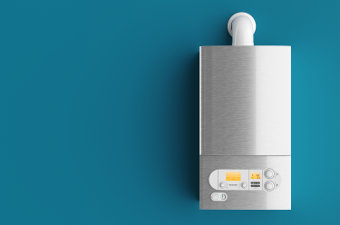Boilers
Last Updated: 02/27/24
A self contained fuel burning appliance of less than 300,000 Btu per hour energy input, for supplying low pressure steam or hot water for space heating applications. A heating unit that meets this definition and also provides hot water for domestic or other use is considered a boiler for purposes of this agreement.
 Product Details
Product Details
-
 Federal agencies are required by statute to purchase products as designated or specified under this program.
Federal agencies are required by statute to purchase products as designated or specified under this program.

 Federal agencies are required to purchase sustainable products and services meeting EPA’s Recommendations to the maximum extent practicable.
Federal agencies are required to purchase sustainable products and services meeting EPA’s Recommendations to the maximum extent practicable.
|
Product Type
|
Procurement Info
|
Where to Buy
|
|---|---|---|
| Biomass Boiler, Wood-Pellet-Fired | ||
| Condensing | ||
| Commercial | ||
| Residential |
 Legal Requirements
Lists federal requirements related to the purchase of this item, including applicable Federal Acquisition Regulation (FAR) requirements
Legal Requirements
Lists federal requirements related to the purchase of this item, including applicable Federal Acquisition Regulation (FAR) requirements
 Life Cycle Cost Savings
Life Cycle Cost Savings
Life Cycle Costing (LCC) aims to quantify the financial impact of a product over its entire life cycle to assist consumers in making decisions that will save them money over the long term.
GSA's Green Proving Ground![]() found that biomass boilers perform at 85.6% efficiency at a 45% partial load. Increased loads will increase efficiency. Payback can be less than 5 years, operating at 75% capacity with average pellet costs. Payback varies by system size and pellet costs, with the greatest savings with larger systems and lower fuel costs. Payback can be more than 20 years for smaller systems when pellet costs are higher (more than $300/ton).
found that biomass boilers perform at 85.6% efficiency at a 45% partial load. Increased loads will increase efficiency. Payback can be less than 5 years, operating at 75% capacity with average pellet costs. Payback varies by system size and pellet costs, with the greatest savings with larger systems and lower fuel costs. Payback can be more than 20 years for smaller systems when pellet costs are higher (more than $300/ton).
GSA's Green Proving Ground![]() found that condensing boilers will outperform conventional boilers by a substantial margin, with a 14% savings in natural gas consumption. Payback is 4 - 7 years at estimated typical cost. At end of life, replacing conventional boilers with condensing boilers is life-cycle cost effective even when only 3 - 5 % more efficient than high-efficiency boilers.
found that condensing boilers will outperform conventional boilers by a substantial margin, with a 14% savings in natural gas consumption. Payback is 4 - 7 years at estimated typical cost. At end of life, replacing conventional boilers with condensing boilers is life-cycle cost effective even when only 3 - 5 % more efficient than high-efficiency boilers.
For most applications, energy-efficient commercial boilers have the lowest life-cycle cost. An efficient product is cost effective when the utility costs saved over the life of the product exceed the additional upfront cost (if any) of the more efficient model. Federal purchasers may assume that Energy Star-qualified products and products meeting FEMP-designated efficiency requirements are life-cycle cost effective. However, users wishing to determine cost effectiveness for their application may do so using the cost savings calculator on FEMP's product web page![]() .
.
 Guiding Principles
Guiding Principles
Contributes to meeting The Guiding Principles for Sustainable Federal Buildings
 Additional Guidance
Additional Guidance
Energy Star applies to residential boilers of up to 300,000 rated capacity (Btu/h) and small commerical boilers of 300,000 - 2,500,000 rated capacity (Btu/h), while FEMP covers commercial boilers of 2,500,000 - 10,000,000 rated capacity (Btu/h).
GSA's Green Proving Ground recommends using biomass boilers in buildings in cold northern climates that use fuel oil and are located within 50 miles of a biomass pellet mill.


 GSA's Green Proving Ground
GSA's Green Proving Ground
 FEMP
FEMP
 Energy Star
Energy Star